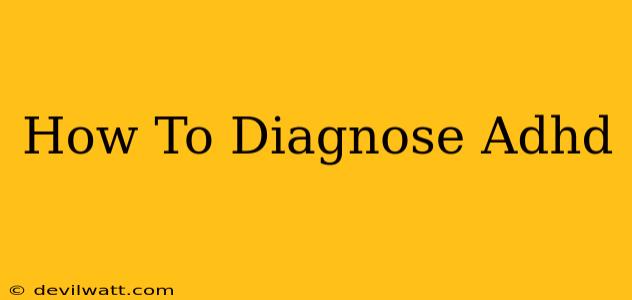Attention-Deficit/Hyperactivity Disorder (ADHD) is a neurodevelopmental disorder that affects millions worldwide. Characterized by inattention, hyperactivity, and impulsivity, ADHD can significantly impact daily life. Understanding how ADHD is diagnosed is crucial for individuals seeking support and treatment. This guide will walk you through the process, outlining key steps and considerations.
Understanding the Diagnostic Process for ADHD
Diagnosing ADHD isn't a simple process; it requires a multifaceted approach involving several key steps:
1. Comprehensive Evaluation by a Healthcare Professional
The first and most crucial step is a thorough evaluation by a qualified healthcare professional, such as a psychiatrist, psychologist, pediatrician, or clinical neuropsychologist specializing in ADHD. These professionals are trained to identify the characteristic symptoms and rule out other potential conditions that might mimic ADHD.
Why a Professional is Essential: Self-diagnosing ADHD based on online information is unreliable and potentially harmful. A professional evaluation ensures an accurate diagnosis, considering individual circumstances and ruling out other potential causes of similar symptoms.
2. Detailed History and Symptom Assessment
During the evaluation, the professional will gather a detailed history of your symptoms, including their onset, severity, and impact on various aspects of your life. This often involves:
- Detailed interviews: Discussions with you (and parents/guardians for children) to understand the nature and frequency of symptoms.
- Behavioral rating scales: Standardized questionnaires completed by you, your parents/guardians, teachers, or other individuals familiar with your behavior. These scales help objectively assess the severity of ADHD symptoms.
- Review of medical records: Examining existing medical records can help rule out other conditions that may be contributing to the symptoms.
3. Observational Assessments (Especially for Children)
For children and adolescents, direct observation of their behavior in various settings – such as school, home, or clinical settings – might be part of the assessment process. This allows the professional to observe symptoms firsthand.
4. Ruling Out Other Conditions
It’s crucial to rule out other conditions that may present with similar symptoms to ADHD. These include, but are not limited to:
- Anxiety disorders: Symptoms like restlessness and difficulty concentrating can overlap.
- Learning disabilities: Difficulties with learning may be associated with ADHD.
- Sleep disorders: Poor sleep can exacerbate ADHD-like symptoms.
- Oppositional defiant disorder (ODD): This involves a pattern of defiant and hostile behavior.
- Autism spectrum disorder (ASD): Some symptoms might overlap.
5. Diagnostic Criteria for ADHD
The diagnosis of ADHD is based on specific criteria outlined in the Diagnostic and Statistical Manual of Mental Disorders (DSM-5) and the International Classification of Diseases (ICD-11). These criteria define the characteristic symptoms of inattention, hyperactivity, and impulsivity, and specify the duration and severity needed for a diagnosis.
Types of ADHD
ADHD is often categorized into subtypes based on the predominant symptoms:
- Predominantly Inattentive Presentation: Primarily characterized by inattention and difficulty focusing.
- Predominantly Hyperactive-Impulsive Presentation: Primarily characterized by hyperactivity and impulsivity.
- Combined Presentation: Characterized by a combination of inattention, hyperactivity, and impulsivity.
Important Note: The subtypes are not mutually exclusive, and symptoms can fluctuate over time.
Seeking Professional Help
If you suspect you or someone you know may have ADHD, seeking professional help is crucial. Early diagnosis and intervention can significantly improve quality of life. Don't hesitate to reach out to your primary care physician or a mental health professional to begin the diagnostic process. Remember, a proper diagnosis is the first step towards effective management and treatment.

